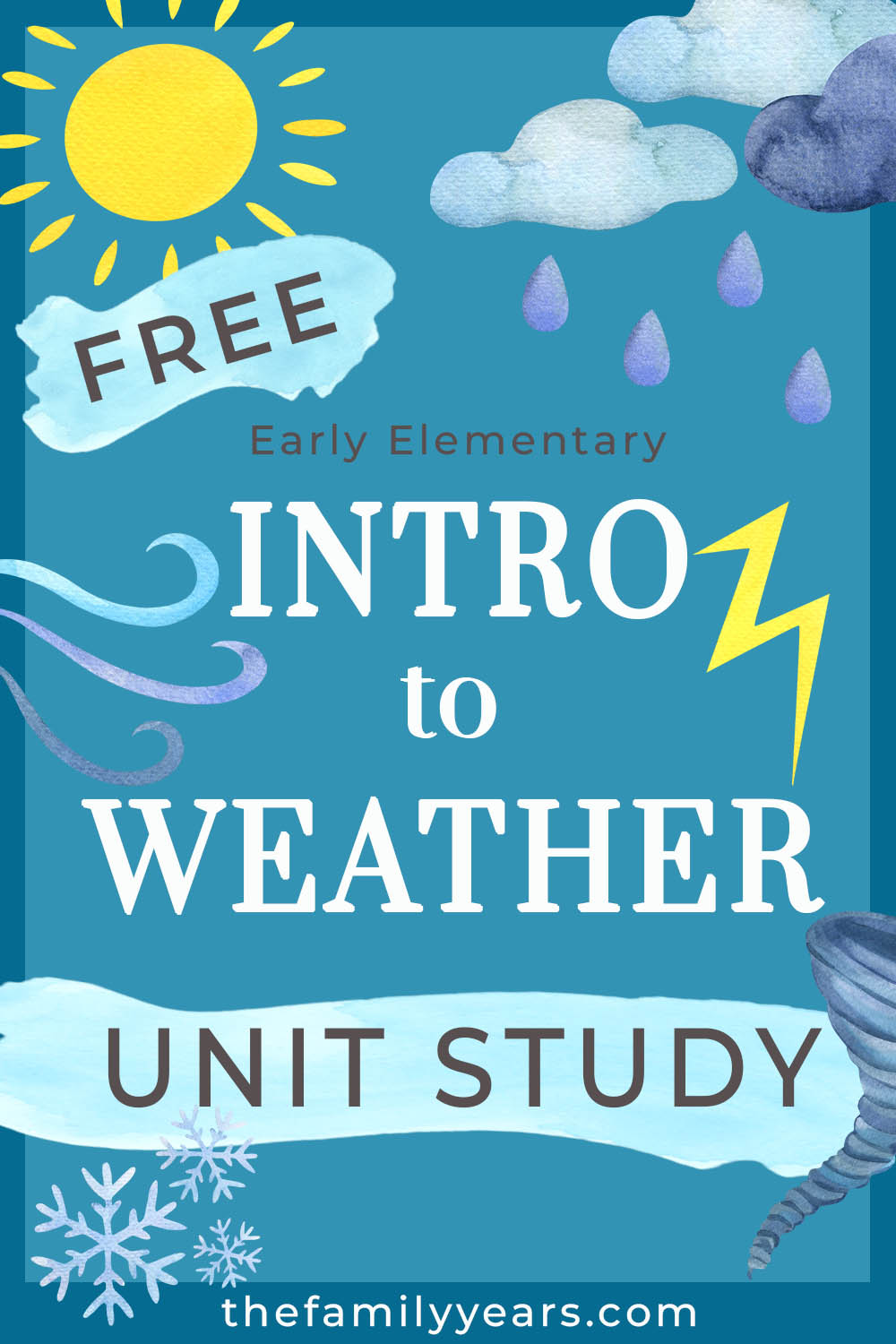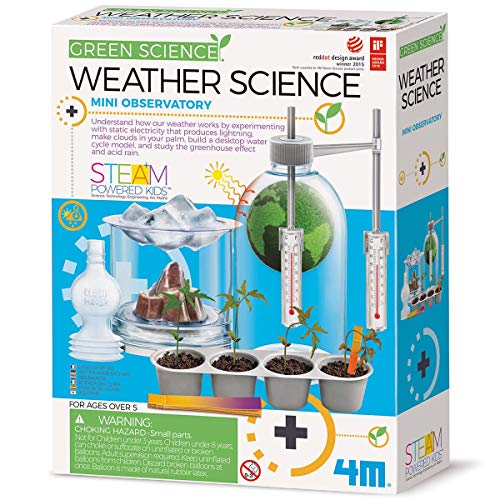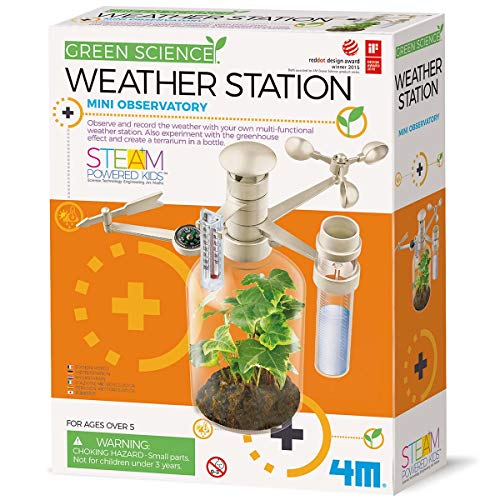Designed for students from 1st grade through 3rd grade, this FREE STEAM-based Intro to Weather Unit Study for early elementary students includes age-related science topics such as comparing weather to climate, types of clouds, stages of the water cycle, predicting weather, extreme weather, and more.
FREE UNIT STUDIES
Intro to Weather Unit Study
August 24, 2024
The following content may contain affiliate links. If you purchase something from the links, we may receive a commission.

Introduction
Welcome to The Family Years – Early Elementary Intro to Weather Unit Study! This FREE STEAM-based unit study includes age-related science topics such as comparing weather to climate, types of clouds, stages of the water cycle, predicting weather, extreme weather, and more.
Designed for students from 1st grade through 3rd grade, children will explore weather through engaging texts, videos, and hands-on activities and experiments. The unit study is designed to touch on specific weather topics each week at a moderate pace.
Each week includes a daily reading out of the textbook(s), a topic-based video, and at least one experiment or activity. At this speed, it will take approximately 7 weeks to complete. As with the other free homeschooling unit studies offered on our site, you are encouraged to go at your own pace, but a 4-day curriculum example is included with each section.
Combine this unit study with our FREE 6-Week Early Elementary Intro to Geology Unit Study for a complete Planet Earth curriculum.
Intro to Weather Textbooks
The early elementary Intro to Weather Unit Study uses two main textbooks, DK’s What’s the Weather?: Clouds, Climate, and Global Warming by Fraser and Judith Ralston and The Secret Signs of Nature by Craig Cuadill. These books can be purchased from the links below or check your local library for titles that you may not be interested in purchasing at this time.
This curriculum also comes with an optional free printable worksheet that covers the entirety of the curriculum. You can print out your copy here.
We are excited that you have chosen to learn alongside us and hope you and your family enjoy this homeschool early elementary Intro to Weather Unit Study!
Are you currently doing our Intro to Weather Unit Study? BOOKMARK THIS PAGE or SAVE THE PDF for easy access to video and activity links!
Please note, The Family Years homeschooling Intro to Weather Unit Study is copyrighted and for personal use only.
Optional Weather Books and Activity Kits
Want to dive in deeper? Check out these additional science books to further enrich your Homeschool Early Elementary Intro to Weather Unit Study!
WEATHER ACTIVITY BOOKS –
FAQ
How long does the unit study take to complete?
Our unit studies are designed to be self-paced, but when covering one section per week, the Intro to Weather Unit Study should take about 7 weeks to complete.
What age range is best for the Intro to Weather Unit Study?
The Intro to Weather Unit Study was created for students in 1st Grade through 3rd Grade and is best suited for kids aged seven through ten.
Do you have to buy ALL the recommended materials?
We would highly recommend purchasing both of the main textbooks since they are used each week. They are also great resources for your home library. To save money, you can check your local library and see what is available to borrow or consider purchasing the books secondhand. The additional resources are completely optional.
Is the Intro to Weather Unit Study really free?
The Intro to Weather Unit Study is completely free. Most of the books included can be found at your local library and the bulk of the activities can be completed with items you already have around the house.
WEATHER TEXTBOOKS FOR KIDS
I. ATMOSPHERE, CLIMATE, AND FORECASTING
- Students will learn about how Earth’s relationship to the sun relates to the weather.
- Students will examine how weather and climate differ.
Day 1
Read – What’s the Weather? – Hot or Cold? (p. 6 – 7), The Secret Signs of Nature – Let the summer sun illuminate the way (p. 44 – 45)
Watch – Current Events
Day 2
Read – Geology for Kids – Through the Year (p. 8 – 9), The Secret Signs of Nature – Predict the changing seasons by tracking migrating animals (p. 34 – 35)
Watch – Seasons and the Sun
Day 3
Read – What’s the Weather? – Predicting Weather (p. 12 – 13), The Secret Signs of Nature – Watch a huddle of sheep to forecast the weather (p. 40 – 41)
Watch – How Do We Know When it Will Rain?
Day 4
Activity – Make a weather journal and track the weather each day
- Hot or Cold? (p. 6 – 7)
- Through the Year (p. 8 – 9)
- Predicting Weather (p. 12 – 13)
- Let the summer sun illuminate the way (p. 44 – 45)
- Predict the changing seasons by tracking migrating animals (p. 34 – 35)
- Watch a huddle of sheep to forecast the weather (p. 40 – 41)
II. INVENTIONS
- Students will learn about climates and microclimates.
- Students will learn about types of clouds.
Day 1
Read – What’s the Weather? – Inventions (p. 44 – 45), The Secret Signs of Nature – Predict a rain shower by connecting with your senses (p. 10 – 11)
Watch – Weather Tools & Instruments
Day 2
Read – What’s the Weather? – Around the World / City Microclimates (p. 14 – 15; 38 – 39)
Watch – Climate Zones for Kids
Day 3
Read – What’s the Weather? – Clouds (p. 16 – 17)
Watch – Types of Clouds
Day 4
Activity – Make a DIY Weather Station
- Inventions (p. 44 – 45)
- Around the World / City Microclimates (p. 14 – 15; 38 – 39)
- Clouds (p. 16 – 17)
- Predict a rain shower by connecting with your senses (p. 10 – 11)
III. THE WATER CYCLE, FOG, AND WIND
- Students will learn about each step in the water cycle.
- Students will learn about fog and wind.
Day 1
Read – What’s the Weather? – The Water Cycle (p. 18 – 19), The Secret Signs of Nature – Observe a rainbow to decipher its message (p. 4 – 5)
*Scientists have differing views regarding where water comes from. This is a good topic to investigate further and discuss with your student(s).
Watch – Where Does Water Come From?
Day 2
Read – What’s the Weather? – Fog (p. 48 – 49), The Secret Signs of Nature – Find your way with a puddle (p. 22 – 23)
Watch – Where Does Fog Come From?
Day 3
Read – The Secret Signs of Nature – Use the shapes of dunes to determine the wind’s direction (p. 12 – 13, Listen to the wind and watch the leaves fall (p. 24 – 25)
*Both of these are on wind. You could read one or both if you have the time.
Watch – Where Does Wind Come From?
Day 4
Activity – Water Cycle in a Bag
- The Water Cycle (p. 18 – 19)
- Fog (p. 48 – 49)
- Observe a rainbow to decipher its message (p. 4 – 5)
- Find your way with a puddle (p. 22 – 23)
- Use the shapes of dunes to determine the wind’s direction (p. 12 – 13)
- Listen to the wind and watch the leaves fall (p. 24 – 25)
IV. WAVES, THUNDERSTORMS, AND EXTREME WEATHER
- Students will learn about thunderstorms.
- Students will learn about extreme weather, including tornadoes.
Day 1
Read – What’s the Weather? – Making Waves (p. 60 – 61), The Secret Signs of Nature – Trail the swell of the sea (p. 14 – 15)
Watch – What are Waves?
Day 2
Read – What’s the Weather? – Thunderstorms (p. 20 – 21), The Secret Signs of Nature – Look up at the clouds to predict a thunderstorm (p. 6 – 7)
Watch – What Causes Thunder and Lightning?
Day 3
Read – What’s the Weather? – Huge Storms / Tornadoes (p. 22 – 23; 58 – 59)
Watch – Severe Weather
Day 4
Activity – DIY Tornado in a Jar
- Making Waves (p. 60 – 61)
- Thunderstorms (p. 20 – 21)
- Huge Storms / Tornadoes (p. 22 – 23; 58 – 59)
- Trail the swell of the sea (p. 14 – 15)
- Look up at the clouds to predict a thunderstorm (p. 6 – 7)
V. DROUGHTS, WEATHERPROOF ANIMALS, AND THE RAINFOREST
- Students will learn about types of droughts.
- Students will learn about animals that have specific characteristics that make them weatherproof.
Day 1
Read – What’s the Weather? – Drought / Ash Particles (p. 36 – 37; 40 – 41)
Watch – Drought
Day 2
Read – What’s the Weather? – Weatherproof Animals (p. 56 – 57), The Secret Signs of Nature – Locate water in a desert (p. 20 – 21)
Watch – Deserts 101
Day 3
Read – What’s the Weather? – In the Rainforest (p. 50 – 51), The Secret Signs of Nature – Locate a spiderweb to catch the wind (p. 38 – 39)
Watch – Rainforests 101
Day 4
Activity – Make a rainforest or desert diorama
- Drought / Ash Particles (p. 36 – 37; 40 – 41)
- Weatherproof Animals (p. 56 – 57)
- In the Rainforest (p. 50 – 51)
- Locate water in a desert (p. 20 – 21)
- Locate a spiderweb to catch the wind (p. 38 – 39)
VI. THE GREENHOUSE EFFECT
- Students will learn what the greenhouse effect is and how it relates to weather on Earth.
Day 1
Read – What’s the Weather? – The Greenhouse Effect / Heating Up (p. 30 – 33)
Watch – What is the Greenhouse Effect?
Day 2
Read – What’s the Weather? – Heatwaves / Big Freezes / Record Breakers (p. 42 – 43; 52 – 53)
Watch – Weather on the Go: Heatwaves
Day 3
Read – What’s the Weather? – The Weather News / Weird Weather (p. 46 – 47; 54 – 55)
Watch – 20 Strangest Weather Phenomena That Actually Exist
Day 4
Activity – Make a S’mores Solar Oven
- The Greenhouse Effect / Heating Up (p. 30 – 33)
- Heatwaves / Big Freezes / Record Breakers (p. 42 – 43; 52 – 53)
- The Weather News / Weird Weather (p. 46 – 47; 54 – 55)
VII. EARLY WEATHER AND FUTURE WEATHER
- Students will learn about snow and the ice age.
- Students will learn about different sources of energy.
Day 1
Read – What’s the Weather? – Snow / Ice Age (p. 24 – 29); The Secret Signs of Nature – Study snow to find your bearings (p. 8 – 9)
Watch – Where do Snowflakes Come From?
Day 2
Read – What’s the Weather? – Early Weather / Planetary Weather (p. 10 – 11; 66 – 67); The Secret Signs of Nature – Learn to read a full moon (p. 46 – 47)
Watch – Weather in Space (the Rocky Planets)
Day 3
Read – What’s the Weather? – Weather Power / Future Weather / Making Changes (p. 34 – 35; 62 – 65); The Secret Signs of Nature – Keep discovering nature’s signs everyday (p. 44 – 45)
Watch – What are Sources of Energy?
Day 4
Activity – The Power of Sunlight!
- Snow / Ice Age (p. 24 – 29)
- Early Weather / Planetary Weather (p. 10 – 11; 66 – 67)
- Weather Power / Future Weather / Making Changes (p. 34 – 35, 62 – 65)
- Study snow to find your bearings (p. 8 – 9)
- Learn to read a full moon (p. 46 – 47)
- Keep discovering nature’s signs everyday (p. 44 – 45)
IF YOU ENJOYED THIS FREE INTRO TO WEATHER HOMESCHOOL UNIT STUDY, YOU MAY ALSO LIKE –
● FREE Intro to Geology Unit Study
● FREE Intro to Space Unit Study
● FREE Around the World Unit Study
● FREE Across the USA – 50 States Unit Study
● 14 Fun Read Aloud Chapter Books for First Grade
● 16 Super Read Aloud Chapter Books for Second Grade
● The BEST 3rd Grade Homeschool Curriculum
● The BEST 2nd Grade Homeschool Curriculum










